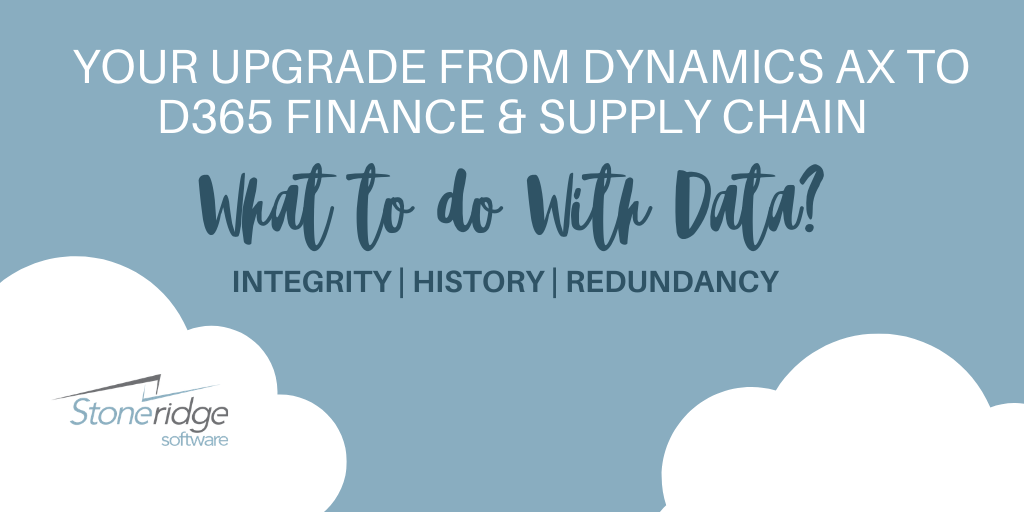What to do With Data When Upgrading Dynamics AX to Dynamics 365 Finance and Supply Chain
Evaluating your data is a core area of consideration when planning your transition from Dynamics AX to Dynamics 365 Finance and Supply Chain. Your upgrade is the prime opportunity for you to address any data issues that may haunt your current AX environment. Verifying the integrity of the data, history, and what you need moving forward is the base level of information you’ll need to gather to determine how you want to proceed with your data. In this blog, we’ll dive into what should be included in the evaluation of the three areas.
Evaluate Data Integrity
Work with members from across your different teams and departments to gauge the level of data integrity within your current AX system. While some members of your team may feel the data is good, there are others who may question the validity of data within certain areas of the system. For example, your AP team may feel the information related to their job functions is solid, but those in AR may have struggled to keep contacts, addresses, and other data up to date.
Once you have an understanding of where your data may need some work, you can start to determine if that information can be salvaged or if you should leave it behind and start fresh in your new D365 environment.
Assess Historical Information
Upgrades can bring all history, but if you have a large number of customizations that need to be rewritten, the same data structures you used in the past may not be used going forward. This could impact your historical data due to new tables or changes. Analyzing data is critical in determining what needs to be brought forward, which in turn affects the effort in migrating data and which path to the cloud is the best for your organization.
All detailed transactional history doesn’t necessarily need to be brought forward into your new environment. Map out what historical data is important to you and why. Is it important for reporting purposes? If that is the case, you could use Power BI to continue reporting on that information without having to migrate it to your new system. If your data is important for future business transactions, it likely will need to be migrated to D365.
Look for Redundant Data
If you’re moving forward any information, it’s important to clean up that data so your new system has quality, accurate data from the start.
- Remove redundant information or duplicates
- Archive or purge information that is no longer valid or past a certain date point
Modification of your master data can be deceptively difficult. Make sure the “juice is worth the squeeze”. When you’re going through this process, it’s not only the product dimensions that are changed. It could also be the product history, on-hand inventory, sales orders, production orders, etc.
Data is where project scope can easily exceed what you had initially budgeted for. As you’re looking at your data, make sure you’re aligning with your partner to stay on the same page regarding cost implications and work efforts related to the data conversion process.
Once you have evaluated your data and what you would like to transition into Dynamics 365, you also need to examine any code or customizations you have in the system and evaluate your business processes. The information you gather in those three areas will inform what path you take when you upgrade. More information on the three paths can be found here.
Ready to talk about your options for upgrading to Dynamics 365 Finance and Supply Chain Management? Reach out to the experts at Stoneridge Software.
Under the terms of this license, you are authorized to share and redistribute the content across various mediums, subject to adherence to the specified conditions: you must provide proper attribution to Stoneridge as the original creator in a manner that does not imply their endorsement of your use, the material is to be utilized solely for non-commercial purposes, and alterations, modifications, or derivative works based on the original material are strictly prohibited.
Responsibility rests with the licensee to ensure that their use of the material does not violate any other rights.

